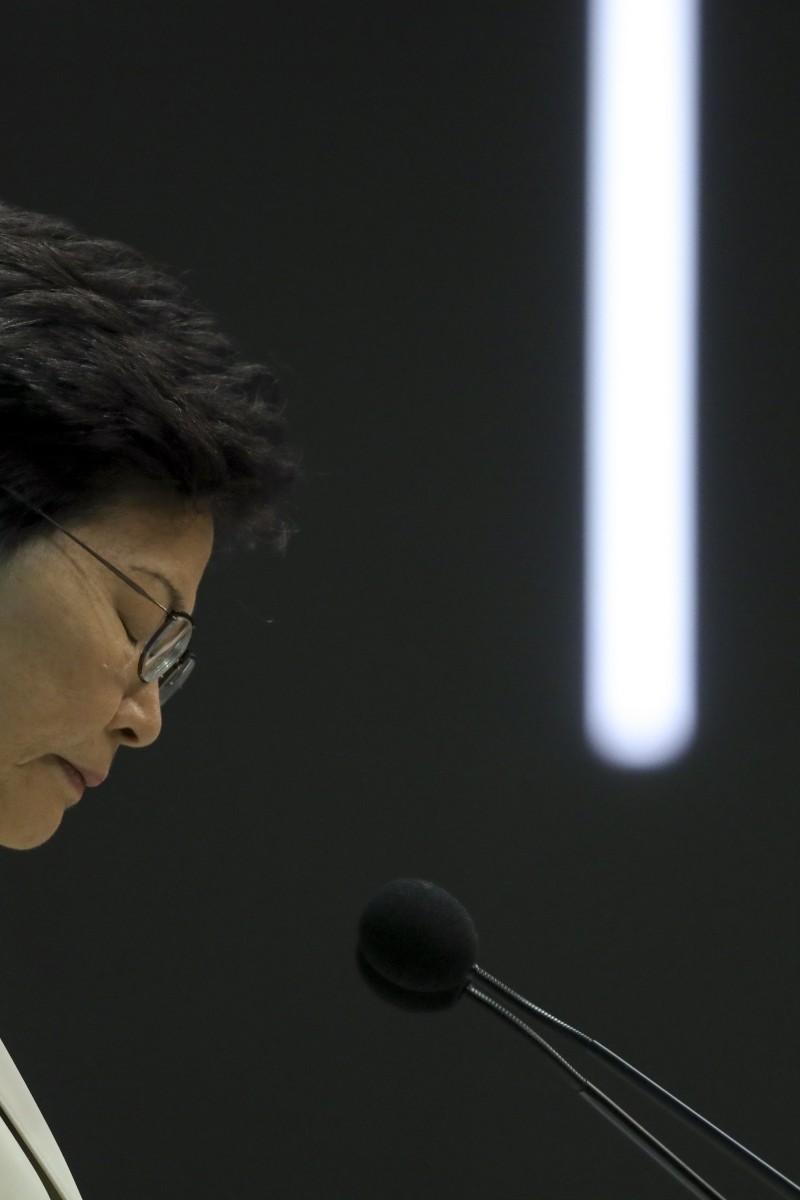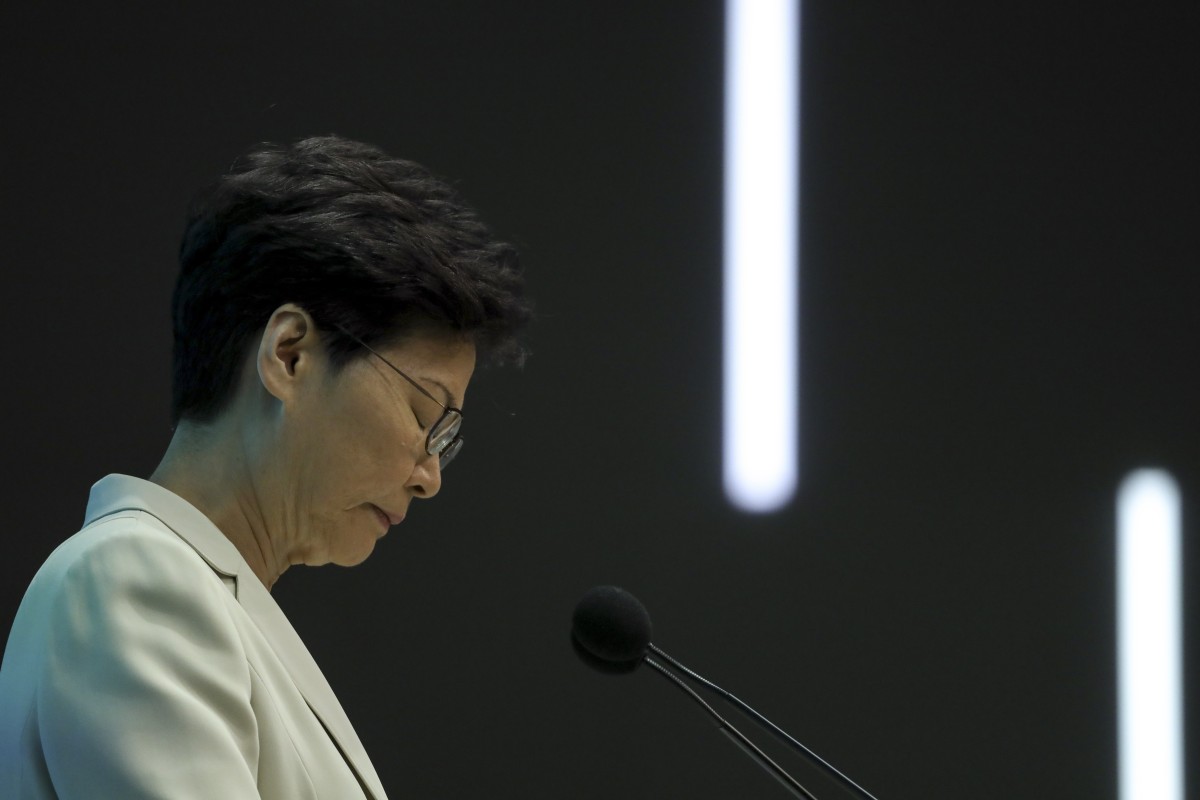
City's leader also says ‘illegal and violent acts on June 12’ will be dealt with ‘impartially and fairly'
 Embattled Chief Executive Carrie Lam is adamant the extradition bill won’t be killed.
Embattled Chief Executive Carrie Lam is adamant the extradition bill won’t be killed. Hong Kong’s embattled leader is keeping a low profile to avoid fanning extradition bill protests ahead of the G20 summit in Osaka this weekend, but she is doubling down on her refusal to completely withdraw the now-suspended legislation, according to multiple sources.
“It is suspended indefinitely, so essentially the bill is dead,” one source said on Tuesday about the unpopular legislation, which would have allowed the transfer of fugitive suspects to mainland China and other jurisdictions with which the city has no extradition deal.
Another source showed the Post speaking notes from a closed-door meeting that Chief Executive Carrie Lam Cheng Yuet-ngor held with business and community leaders after mostly young protesters laid siege to police headquarters in Wan Chai for 15-hours from last Friday to Saturday morning.
The notes showed Lam indicating that she would not give in to protesters’ repeated demands for an inquiry into the use of force by police, or exonerate those arrested.
She stressed the importance of supporting the police force, safeguarding the government’s dignity, defending the city’s rule of law, and embarking on a new start for Hong Kong after the conflicts caused by the bill.
“[We] have the duty to defend the rule of law, and will impartially and fairly deal with the illegal and violent acts committed on June 12,” she said, referring to violent clashes between police and protesters trying to storm the Legislative Council headquarters in Admiralty.
As for the siege of police headquarters, on which she has not spoken publicly yet, Lam said: “When police dignity is being trampled upon and authority challenged, society should strongly condemn such acts, and support the police in maintaining law and order and protecting citizens according to the law.”
With various groups planning another wave of protests against the bill starting from Wednesday, British foreign secretary Jeremy Hunt, former Hong Kong official Helen Yu Lai Ching-ping and a group of local religious leaders and academics were the latest to join the chorus of calls for Lam to launch an independent inquiry into the June 12 violence.
Senior mainland Chinese official Li Fei, who chairs the Constitution and Law Committee under China’s top legislative body, the National People’s Congress Standing Committee, also commented on Tuesday for the first time on the mass protests triggered by the government’s efforts to bulldoze forward with the bill.
“I cannot understand why violence has to be used every time they protest against the government,” Li said.
The backlash against the government’s handling of the bill has taken a toll on its relationship with its political allies as well as Lam’s popularity.
According to the University of Hong Kong’s latest ratings, Lam’s popularity plunged to 32.8 out of 100 points last week, making her the most unpopular chief executive since the city returned from British to Chinese rule in 1997.
Government officials were lying low again on Tuesday, with sources having told the Post that they were reluctant to provoke more intense protests ahead of a much-anticipated meeting between President Xi Jinping and his US counterpart Donald Trump at the Group of 20 leaders’ summit.
Protesters were planning to petition consulates of the G20 nations in Hong Kong on Wednesday in a bid to take their case to the international community.
The Civil Human Rights Front, which organised the last two mass rallies that drew historic numbers of protesters, planned to organise a “G20 Free Hong Kong” rally at Edinburgh Place, Central on Wednesday night.
The front had five demands for Lam: step down; completely withdraw the bill; exonerate those arrested earlier; retract all references to the protest on June 12 as a “riot”; and order an independent inquiry into the clashes that day.
Addressing the British parliament on Tuesday, Hunt urged the Hong Kong government “to establish a robust independent investigation into the violent scenes that we saw”.
“The outcome of that investigation will inform our assessment of future export licence applications to the Hong Kong police,” he said, referring to tear gas and other law enforcement tools supplied by Britain.
Hong Kong extradition bill: Live updates as protesters attend mass assembly ahead of G20 summit
Yu, a former director of education told the Post she backed the idea of setting up a commission of inquiry to look into the entire circumstances surrounding the extradition bill.
“If an inquiry commission is to be set up, it should investigate protesters’ activities and the police’s use of force in Admiralty on June 12,” she said.
Helen Yu Lai Ching-ping, who did not sign the joint letter signed by 32 former top officials and politicians on Sunday calling for the bill to be withdrawn, said she was surprised that in the face of the chaos and disruption caused by the “so-called peaceful” protesters who besieged police headquarters and government buildings in Wan Chai, those former officials were not joining voices to pacify the mob and lend their support to government and the police.
Yu disagreed with the demand of exonerating those previously arrested, because it went against due judicial process. “We’re finished if we do not maintain law and order as well as the rule of law,” she said.
Yu called on the public to give Carrie Lam, who she said was a conscientious public servant, another chance to continue to serve them.